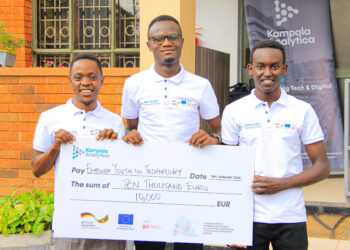“Youths are majority of the population and the next generation of taxpayers. However, they have not effectively participated in matter concerning taxes. The policies in place in regards taxes are not exactly responsive to their needs and this is partly because of lack of participation in these matters by youths,” said Grace Namugambe, the program officer in charge of financing for development at SEATINI Uganda.
She was on Friday speaking during a session on youth and tax under the theme “Breaking the barriers to meaningful youth participation and inclusion in advocacy for fiscal justice” organized by SEATINI Uganda in partnership with the Institute for Social Transformation (IST), Oxfam and FEMNET with support from European Union.
The session in commemoration of the Africa youth day and month was held at the Teenage Learning Centre in Kamwokya, Kampala.
According to Namugambe, there is need for effective youth participation in fiscal policy processes since they have a significant and lasting effect on their country’s trajectory.
“The youths have a big role to play in taxation processes but have not had their voices heard. This session is aimed at ensuring youths are given awareness on the need for their participation in taxation processes and having their voices heard to ensure policies responsive to their needs. Ours is to ensure youth voices are heard when it comes to taxation.”
According Moureen Wagubi, the Executive Director for Institute for Social Transformation said there is need for youths to be aware of how taxes are used by government but also have a chance to have an input in decisions regarding taxation.
“We want to raise awareness for youth to get so much involved in knowing about their taxes but also hold leaders accountable. As an institution, we have carried out capacity building of youths especially in markets ensuring they know about taxes but how to engage with leaders in demanding accountability,” Wagubi said.
“We have built their capacity to know that no one will come to talk about their issues concerning their taxes apart from themselves. We empower them in business and financial literacy because through their businesses they will contribute taxes to the economy to ensure delivery of servicers.”
Wagubi noted that it is high time youths are brought to speed to appreciate that taxes are good for the country and should participate in paying them but also follow up on the taxes.
According to Andrew Bukenya, a tax education officer with Uganda Revenue Authority, whereas over 20 million Ugandans are eligible to pay taxes, only 1.2 million of these pay taxes.
He noted that despite Uganda running a self-assessment tax regime, many people including youths deliberately avoid paying taxes.
“Youths are future of this country but also self-employment is the way to go. If you have a small business, our regime is one that allows you to self-assess and know the amount to pay in taxes. The problem with many Ugandans is that they fail to pay taxes and wait for URA teams to come and estimate the taxes they are supposed to pay. Don’t wait for URA but do your own self-assessment and you will realise that the amount of tax you are supposed to pay is very little,” Bukenya said.
He however emphasized the need for everyone to have a tax identification number(TIN) not only for purposes of paying taxes but for other benefits as well.
“If you have a small business and you want to supply products to a supermarket, you must have TIN. If you want to purchase a car, change its log book or buy land you must have a TIN. If you are to get a tender or contract to supply to government, you are required to have a TIN. Don’t look at it as one used only for purposes of paying taxes.”
The URA tax education officer however noted that the tax body has started a campaign to education Ugandans on the benefit of paying taxes but also to expand the tax registry.









